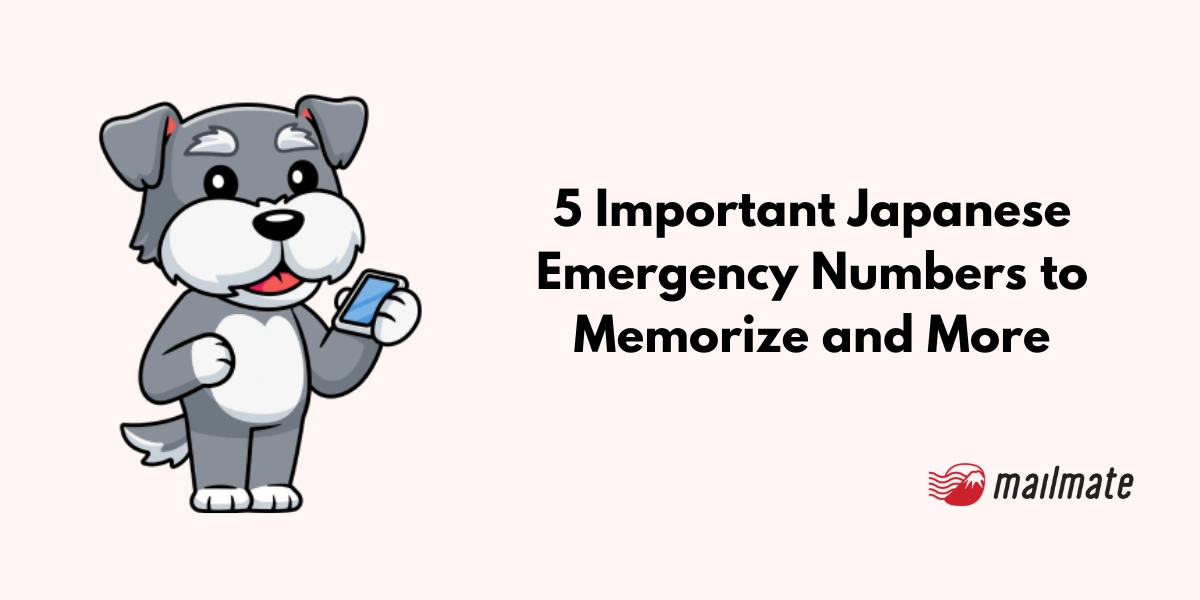5 Important Japanese Emergency Numbers to Memorize and More

In Japan, locals and foreign residents must know the phone numbers of emergency services.
Whether it's a crime, medical emergency, fire, or a situation at sea, making a quick deal makes all the difference.
So, we provide you with 5 Japan’s emergency numbers and a bonus service so you can quickly access help when needed.
Japan’s emergency numbers to know
Here are 5 emergency numbers in Japan to know, especially if you live there, plus a bonus one.
1. Police: 110

Japan's police emergency number is 110, and it is for any situation involving crimes or accidents, such as theft, assaults, traffic incidents, and unlawful activities.
Don't worry too much about speaking Japanese. Japan's 110 number tends to have English speakers who can speak directly to you or make a three-way call with an interpreter. If you are a victim of a crime while at a police station, they will have interpreters in person or on the phone for you.
In case of a traffic accident, father the other party's name, address, phone number, and license plate, as well as take photos of the accident and any witnesses' contact information. Then, follow the police's instructions.
2. Ambulance: 119

119 is the Japanese phone number for the ambulance in case of a fire or medical emergency.
When calling the operator, tell them it is a medical emergency, and they will send the operator service. Don't worry about speaking Japanese; they have English operators or an English interpreter on call.
While on call, tell the operator about the condition of the injury or sickness, such as when it occurred, where on the body, and how it happened.
Additionally, you will need to tell the operator your name, phone number, and location address. If you are unsure about the exact address, use landmarks such as intersections, stores, nearest stations, etc.
When you hear the sirens, meet the ambulance or the staff and guide them to the injured person.
Please note an ambulance ride to the hospital is free.
3. Fire: 119

Japan's emergency number in case of a fire is 119. Yes, it is the same for the ambulance. So you need to tell the operator you need fire trucks. If there is an injured person because of the fire, tell them you will also need an ambulance.
When the operator asks, tell them the situation and your location. Then, they will send someone from your nearest fire department.
Once the operator is fully aware of the situation and has the information, wait for the fire truck to arrive at a safe location and guide them to the fire.
4. Coast Guard (for sea rescue): 118

Japan's emergency number 118 is the direct line to Japan's Coast Guard. It should be used for emergency rescue at sea, maritime accidents, and other emergencies at sea.
An English-speaking operator for the Japan Coast Guard is available 24/7 for non-Japanese speakers.
When providing information, use landmarks, GPS coordination, or other surrounding descriptions so the Japanese Coast Guard can locate you.
Follow the operator's instructions and guide the rescue team to your location.
5. Non-emergency medical consultation: #7119

TFD Emergency Telephone Consultation Center
#7119, the pound sign is necessary, but it is a non-emergency number. Once you've explained your situation, they will decide if you need an ambulance. If not, they will give you 3-4 hospitals closest to you with the correct department to go to for your injury.
Once you arrive at the hospital, tell the staff that #711 referred you here.
Mental health and emergency support services in Japan
Tell Japan

Tell Japan is a non-profit organization, and confidential support services are available to anyone in Japan who is going through a difficult time or facing personal struggles.
So if you are dealing with stress, anxiety, depression, or need someone to talk to, Tell Life Line will be there to listen. They will lend an ear to anybody who needs one in Japan.
Additionally, they have counseling services for individuals, couples, and families in Japan who are dealing with stress, relationship issues, or other mental health concerns.
They have locations in Tokyo and Okinawa but offer chat, video, remote, and telephone counseling.
However, for more medical pressing matters, you must call 119 for the ambulance or 110 for the police.
How to communicate in an emergency in Japan
All emergency phone calls have to go through a script, so effectively communicating what you need, how, and where is crucial to getting an emergency response.
Again, there will usually be an English interpreter. However, if that is not possible, here is how to call an ambulance in Japanese.
Japan's Fire and Disaster Management Agency created this pamphlet to help you make an emergency call in Japanese.
Step 1: Call 119 and say “kyūkyū desu.”
When saying "kyūkyū desu," you can say it's a medical emergency.
Step 2: Say your address, “jyūsho wa ~.”
It would be best to have your address memorized or phonetically written somewhere on you so it can be easily accessed and readable for your convenience.
For locations other than your home address, use the place's name or a nearby landmark, such as the train station or bus stop.
Step 3: Say your symptoms
Some common medical symptoms include:
Symptoms |
English pronunciation |
Japanese |
|---|---|---|
Abdominal/stomach pain |
fukutsuu desu/itsuu desu |
腹痛です/胃痛です |
Allergic reaction |
arerugi hannou desu |
アレルギー反応です |
Bleeding |
shukketsu desu |
出血です |
Broken bone |
kossetsu detsu |
骨折です |
Burn |
hidoi yakedo desu |
ひどい火傷です |
Chest pain |
mune ga itai desu |
胸が痛いです |
Convulsions |
keiren desu |
痙攣です |
Difficulty breathing |
kokyū kon'nan |
呼吸困難です |
General injury |
kega desu |
怪我です |
Headache |
zutsuu desu |
頭痛です |
High fever |
kou netsu desu |
高熱です |
Poison gas |
doku gasu desu |
毒ガスです |
Poison |
dokubutsu desu |
毒物です |
Pregnancy-related issue |
ninshin shiteimasu |
妊娠しています |
Sick |
byōki desu |
病気です |
Unconscious |
ishiki fumei desu |
意識不明です |
Step 4: Start your age by saying “~ sai desu.”
You should be okay with the Japanese number.
For example, someone 55 years old would say, "go juu go sai desu."
Step 5: State your name and contact information.
In case they can not find you or need to call you back.
Start by saying, "Watashi no namae wa ~ desu. Denwa bangō wa ~ desu.”
Memorize your phone number in Japanese in advance.
Step 6: Wait for emergency personnel to come.
Keep your phone on you and go outside to signal or wave to the emergency personnel coming.
In closing
Whether you are dealing with a crime, medical emergency, or fire or need support at sea, knowing Japan's emergency number helps you respond quickly without needing to look up the information.
For any potential natural disaster, please refer to this disaster prevention pamphlet .
Spending too long figuring out your Japanese mail?
Virtual mail + translation services start at 3800 per month. 30-day money-back guarantee.

